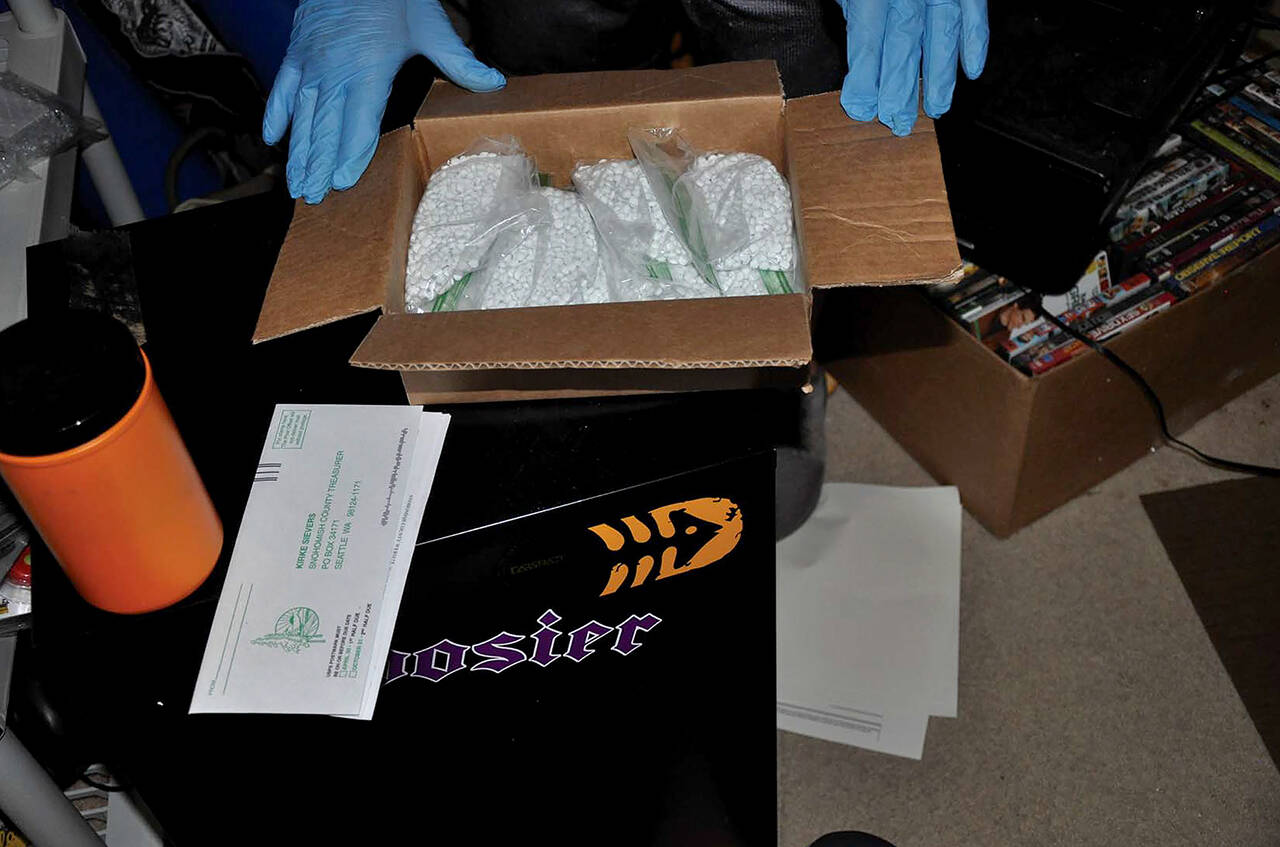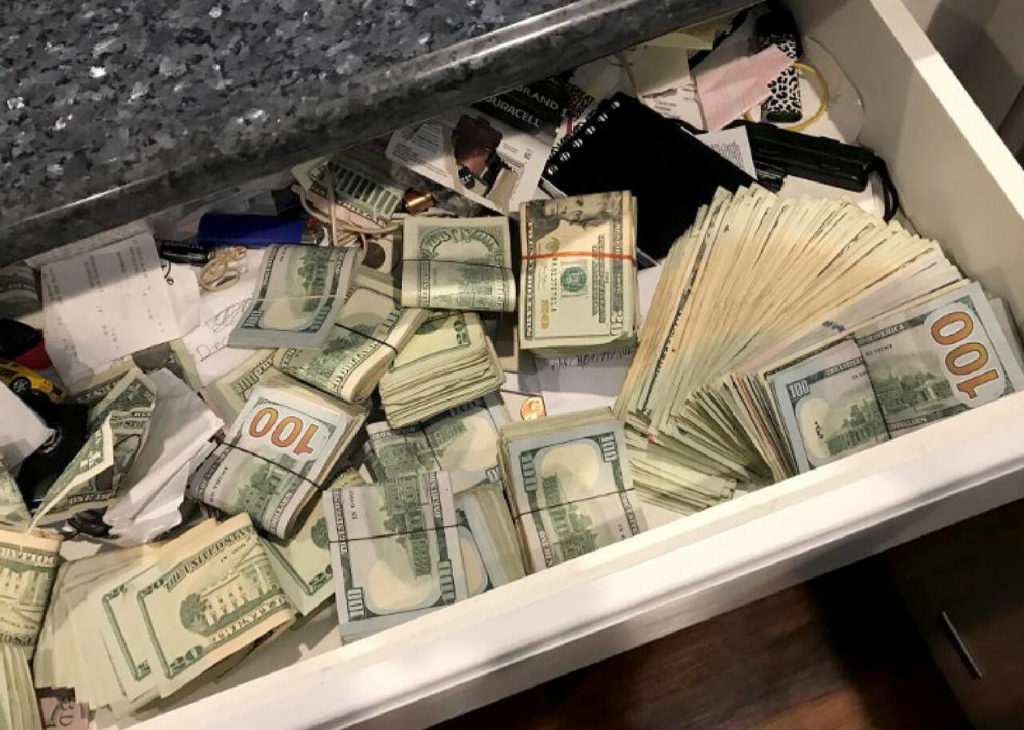SEATTLE — From 2016 to 2019, Anthony Pelayo was one of the region’s most prolific drug traffickers, federal prosecutors allege.
In August, a jury in U.S. District Court convicted him of over a dozen counts of drug trafficking and money laundering.
Pelayo, 34, of Marysville, was sentenced Tuesday to 15 years in prison, the mandatory minimum. Judge John Coughenour also fined him $150,000.
Another member of his drug ring, Jerome Isham, of Everett, was sentenced to 10 years, also the minimum he faced.
Isham, 40, was one of the operation’s main dealers. He distributed nearly 100,000 illegal fentanyl pills between July 2017 and June 2018, according to evidence shown at trial. Isham also recruited people to receive shipments of drugs from China.
The Everett man was convicted of fewer charges. A jury found him guilty of possessing and distributing the drugs, as well as illegally having a gun.
Fentanyl is a highly potent synthetic opioid that has been attributed to a dramatic spike in overdoses both locally and nationally. So far this year, there have been 113 overdose deaths involving fentanyl in Snohomish County, according to the medical examiner’s office. There were 124 in 2020; 71 in 2019; and 47 in 2018.
In a text message, Pelayo reportedly said he wouldn’t consume the pills he made because they were too intense.
“B goin to the hospital lol,” he wrote, according to court papers.
Federal prosecutors recommended Pelayo get a 25-year sentence. They pushed for Isham to be sentenced to 15 years.
After the judge handed down the first sentence, Pelayo’s lawyer scribbled something on a sheet of paper. Pelayo responded with a thumbs up. Isham looked to friends in the courtroom and subtly pumped his fist when he got his sentence.
Both men addressed the court Tuesday morning. Both thanked their friends and family for packing the courtroom for the hearing. And both said they wanted to do better.
“Trust me, I am deterred,” Pelayo said.
He added, “I won’t let my family down.”
He also said prosecutors have tried to portray him as the “Pablo Escobar of Marysville and it’s not true.”
Pelayo wants to build some skills while in prison, he wrote to the judge Nov. 16.
“Upon my release, I plan to be well equipped and prepared to be a successful, productive member of my community,” he wrote.
Isham’s troubled past played a role in the judge’s sentencing decision. His grandfather raised him from ages 3 to 11. When his grandfather died, Isham was sent into a “downward spiral brought on by a foster care environment that was an embarrassment, at a minimum, and damaging to Mr. Isham to a degree that is difficult to comprehend,” his defense attorneys wrote in court papers.
“In all my years … I don’t think I’ve seen anyone who was dealt as bad a hand as Mr. Isham was,” Coughenour said Tuesday.
Isham said Monday he knows he is capable of getting back on the right path.
“There was a time in my life when I didn’t care, when life had no meaning to me,” he said in court. “I let my addiction take over my life, not realizing I had a lot more than I thought I did. My path has opened my eyes to what really matters to me most and now I cherish that and I do care and I will persevere.”
He has served prison time for drug offenses on several occasions since 1999.
Pelayo was the ring’s second-in-command, according to prosecutors. On top was Bradley Woolard, of Arlington.
In July 2018, officers from the Drug Enforcement Administration and the Snohomish Regional Drug and Gang Task Force searched Woolard’s Arlington-area home, finding more than 12,000 fentanyl pills pressed to look like prescription oxycodone. The blue pills, with an “M” on one side and “30” on the other, tested positive for furanyl fentanyl, a combination of fentanyl and another controlled substance.
The next day, Pelayo texted that “the (main) guy got cracked yesterday,” according to court documents. An associate told Pelayo he should quit.
“Lol (expletive) that I’ll never quit,” he reportedly responded.
In other searches of Woolard’s five-acre property, authorities found more than $1 million in cash and gold hidden in a secret room, along with 29 firearms — rifles, shotguns, pistols — and thousands of rounds of ammunition.
Woolard learned how to buy fentanyl through the dark web, a part of the internet where users can hide their activities, according to testimony during the 10-day trial. He had been trafficking drugs for about three years when his house was raided.
In a home office trash can, federal authorities seized shipping labels marked “Lab Supplies.” One had been sent from an address in Nanjing, China, to a home near Verlot in Snohomish County.
Woolard taught himself how to make homemade pills. He bought a pill press and mixing materials online. His operation had the capacity to produce 2.5 million pills containing fentanyl and furanyl fentanyl, according to trial testimony. He regularly provided thousands of pills to dealers.
Pelayo took over the pill-making operation in 2017. He continued Woolard’s work in rural Snohomish County while Woolard kept ordering fentanyl from China.
Assistant U.S. Attorney Karyn Johnson said in court Monday “it takes a particular type of depravity to do what Mr. Pelayo and Mr. Woolard did.”
Eleven defendants in total faced criminal charges in the drug ring. Eight have pleaded guilty. Half a dozen have already been sentenced, most to time served.
Woolard is set to be sentenced next week on 28 criminal counts.
Jake Goldstein-Street: 425-339-3439; jake.goldstein-street@heraldnet.com. Twitter: @GoldsteinStreet.
Talk to us
> Give us your news tips.
> Send us a letter to the editor.
> More Herald contact information.



























